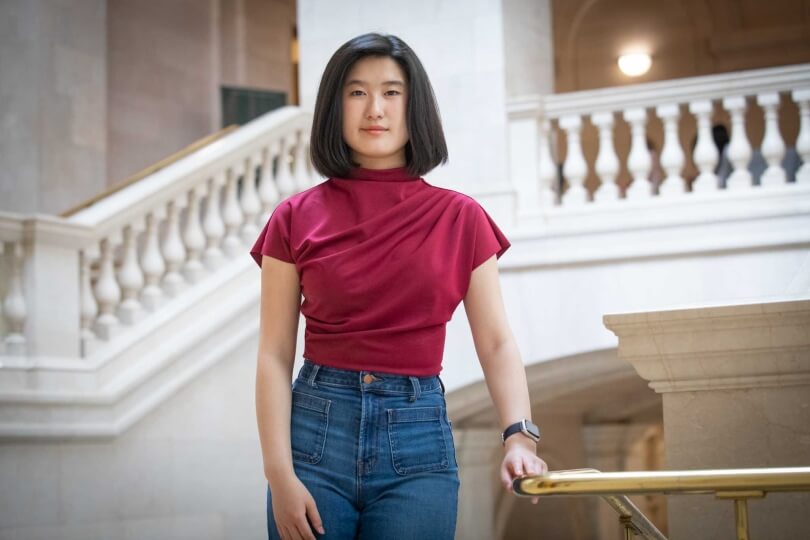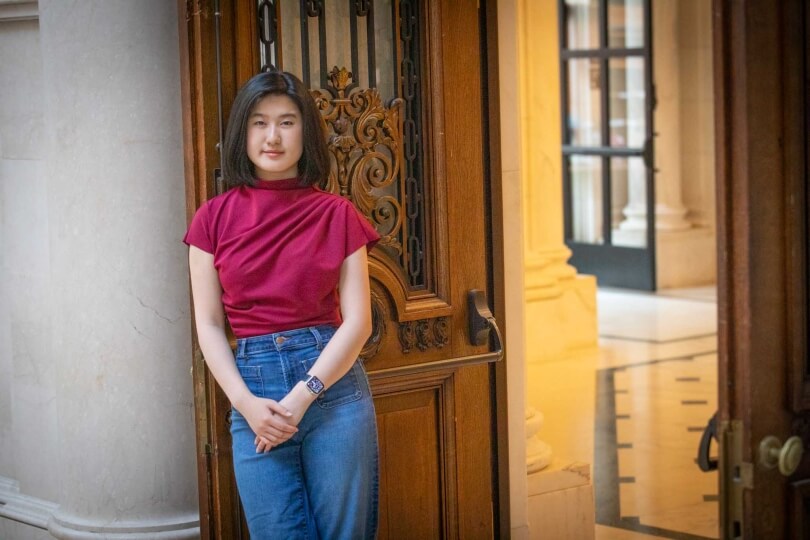Emma Yang, A.B. '25, in computer science (Eliza Grinnell/SEAS)
Computer science is in Emma Yang’s blood. Her father was a computer scientist, and her mother studied math and statistics in college. As a 6-year-old in Hong Kong, she was already learning how to code using Scratch, a free visual programming language and platform. She’d pour over her parents’ old computer science books, trying to teach herself increasingly more challenging coding languages.
“My parents had a running joke that as a kid I’d be up late writing code, and they’d tell me to go to bed, and I’d just keep asking for five more minutes,” she said. “What I loved about coding was just sitting down and writing programs.”
Kid-friendly coding languages eventually gave way to full-on application development. Even before going to high school in New York, she founded a start-up for her app Timeless, a mobile aid for people living with Alzheimer’s disease or dementia.
Yang has always sought the next big challenge in computer science (CS), and right now that’s quantum computing, an idea she first read about in Time articles while in high school. Then the Harvard John A. Paulson School of Engineering and Applied Sciences (SEAS) announced its new quantum science and engineering Ph.D. program in 2021, and Yang knew Harvard would be the perfect place to study this new, exciting field. Within a year of arriving here, she’d founded the Harvard Undergraduate Quantum Computing Association.
“We had so much interest from Day 1. We went to the student organizations fair in the fall to advertise, and got so much interest,” Yang said. “Something I’ve loved so much about Harvard is that there’s always a community to rally around the ideas that students come up with. If you’re a self-starter, and want to shoot for the moon and make your idea happen, there are so many faculty and peers who’ll help.”
In her three years as club president, Yang has helped the Quantum Computing Association continue to grow. She’s brought in researchers and industry professionals for talks, and last summer partnered with qBraid, a quantum computing start-up, to design a semester-long mentorship program.
“They reached out about a coalition they were forming of student teams that are interested in quantum computing, so they could provide free computing power for them, as well as access to their scientists,” Yang said. “We’d always wanted to do more hands-on projects, something that would bring students together to work on projects with mentorship and backing. So I proposed a program where we’d have students form teams to learn about quantum computing, and they’d run all their code on qBraid’s cloud computing platform. We had 12 teams, around 48 people across classes and disciplines, participate in our program the first semester. We ran a hackathon, and then presented our projects to the CEO of qBraid. That was just a really exciting opportunity to see the progress that we’d made.”
Emma Yang's contributions to the SEAS computer science community include Harvard Undergraduate Quantum Computing Association, working as a teaching fellow and serving on the CS Curriculum Committee (Eliza Grinnell/SEAS)
Founding a club is just one way Yang has always tried to bring new people into the world of CS. In high school, she founded a computational thinking summer program for girls in middle school. Technovation, a non-profit dedicated to bringing more girls into computer science and technology, brought her in as a keynote speaker at their 2024 World Summit, almost 10 years after she attended as a sixth grader and won second place globally for her app.
“There aren’t a lot of us in technology, but there are so many people invested in bringing women together and helping them learn about technology and break into the space,” she said. “That motivated me to see in what ways I could contribute to the cause.”
Yang’s academic passions lie at the intersection of artificial intelligence (AI) and data systems. She took “CS 61: Systems Programming and Machine Organization” as a freshman, which she described as “putting a name to all the things I’d had an intuition about” in computer science. That guided her to many more courses on databases and operating systems, and eventually her lap research with Straos Idreos, Gordon McKay Professor of Computer Science at SEAS. Idreos eventually became her senior thesis advisor on a project that won a Thomas Temple Hoopes Prize from the Faculty of Arts & Sciences for outstanding undergraduate scholarly work or research.
“There hasn’t been a CS class that hasn’t been mind-blowing,” she said. “My research focuses on training large AI models across thousands of processors. My thesis is on quantization, which is compressing and speeding up really large models.”
Yang eventually became a teaching fellow for CS61 and another class on programming languages. Alongside her coursework, Yang has also helped shape the future of CS at SEAS as a three-year member of the CS Curriculum Committee.
“Having been a student for so long, I thought it’d be a wonderful opportunity to get a sense of how the design of pedagogy works, and bring a student’s perspective to the curriculum,” she said. “We talked a lot about what we want a computer science student at Harvard to take away from four years in our program. It’s been really cool to interact with faculty every two weeks, get their perspectives on all kinds of educational challenges, such as how we adapt to the interest in artificial intelligence.”
SEAS is Yang’s home during the school year, but her summers have been spent at Hudson River Trading (HRT) in New York. First getting involved with their Women in Trading and Technology Internship winter break program as a freshman, she returned that summer as a software engineering intern, then a year later became a quantitative researcher in the HRT AI Labs.
When she chose to come to Harvard, Yang couldn’t have predicted how much Harvard’s computer science community would affect and inspire her. Now in the final days of her time here, she knows it was the right choice.
“One of the things I feel luckiest about is all the relationships with faculty I’ve been able to develop. What I’ve had in every one of my classes is an opportunity to talk to my professors, not just about the course, but research interests and just life in general,” she said. “I’ve really loved my time here at Harvard. I’ve found a really wonderful community who’ve helped me grow so much as a human being, student and researcher.”
Press Contact
Matt Goisman | mgoisman@g.harvard.edu

